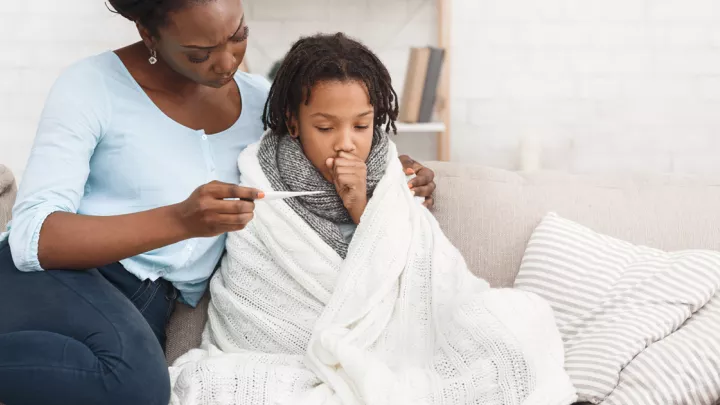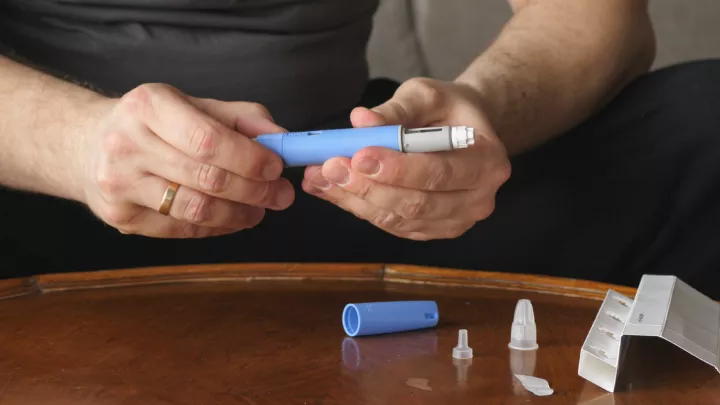When you’re feeling sick: When and where to get tested

It seems inevitable. When fall rolls around, and you begin to feel a crisp chill in the air, the cold and flu viruses soon follow.
This year, not only do we have the cold and flu to contend with, but we also have new strains of the COVID-19 virus and RSV. With each of them sharing similar symptoms, it can be difficult to know what you have and when to see your doctor.
Who should get tested
Emily Hill Bowman, MD, Nebraska Medicine internal medicine specialist, recommends getting tested soon after symptoms begin. “New swab tests can now test for all three viral infections at the same time if needed,” says Dr. Hill Bowman. “With COVID-19 in the mix, knowing what you have early on will help you better manage the symptoms with proper treatment. You will also know how long you should stay home and practice isolation. Additionally, when diagnosed early, both the flu and COVID-19 can be treated with antiviral medicines that can help lessen symptoms and shorten their duration.”
High-risk individuals
Early diagnosis and treatment are especially important for high-risk groups, notes Dr. Hill Bowman. This includes:
- The elderly
- Babies under six months
- Individuals with suppressed immune systems
How to schedule a swab test
Start by scheduling an On-Demand Video Visit with a Nebraska Medicine provider. Once scheduled, one of our providers can usually visit with you within 15 minutes. The provider will be able to help you determine whether you should be tested and for which viruses. If it is determined you should be tested, you will be sent an order for testing through OneChart l Patient and given options for locations to be tested.
You can also get tested at one of our Immediate Care Clinics that are open Monday through Friday, 6 to 9:45 p.m.; Saturday and Sunday, 10 a.m. to 7:45 p.m.; and holidays, 11 a.m. to 3:45 p.m.
Home COVID-19 tests
Home testing is also an option. “These are not 100% effective, so even with a negative test, you should retest a couple days later,” says Dr. Hill Bowman. “If you are still feeling bad after several days with negative testing, consider scheduling an On-Demand Video Visit and getting tested at one of our many convenient locations.
Always see your doctor if:
- Your cold is accompanied by wheezing, shortness of breath, vomiting or a sore throat that lasts longer than a week or hurts intensely and involves difficulty swallowing or breathing
- Your symptoms are severe and include nausea and vomiting, you cannot keep down liquids, or you have a fever that continues beyond five days
- Your symptoms are severe, and you have other chronic conditions such as chronic obstructive pulmonary disease, or COPD, asthma, diabetes, heart disease, cancer, or you are a smoker. A common complication of the flu is pneumonia, particularly in the young and elderly and those with other chronic conditions such as heart or lung problems
- Your child has fast or troubled breathing, turns blue, cannot keep fluids down or eat anything and has had only urinated once or had one wet diaper in 24-hours
- Your child has a severe sore throat, inflammation in the back of the throat, a tender neck, nasal flaring or drooling. These are symptoms of epiglottitis, which can be life-threatening
How do symptoms differ between the flu, cold, COVID-19 and RSV?
Not sure what you have? These articles will help shed some light.
Learn more about flu versus COVID-19 symptoms.
Learn more about cold versus flu symptoms.
Learn more about symptoms for RSV.
Call us at 800.922.0000 to schedule an appointment or schedule an On-Demand Video Visit.







